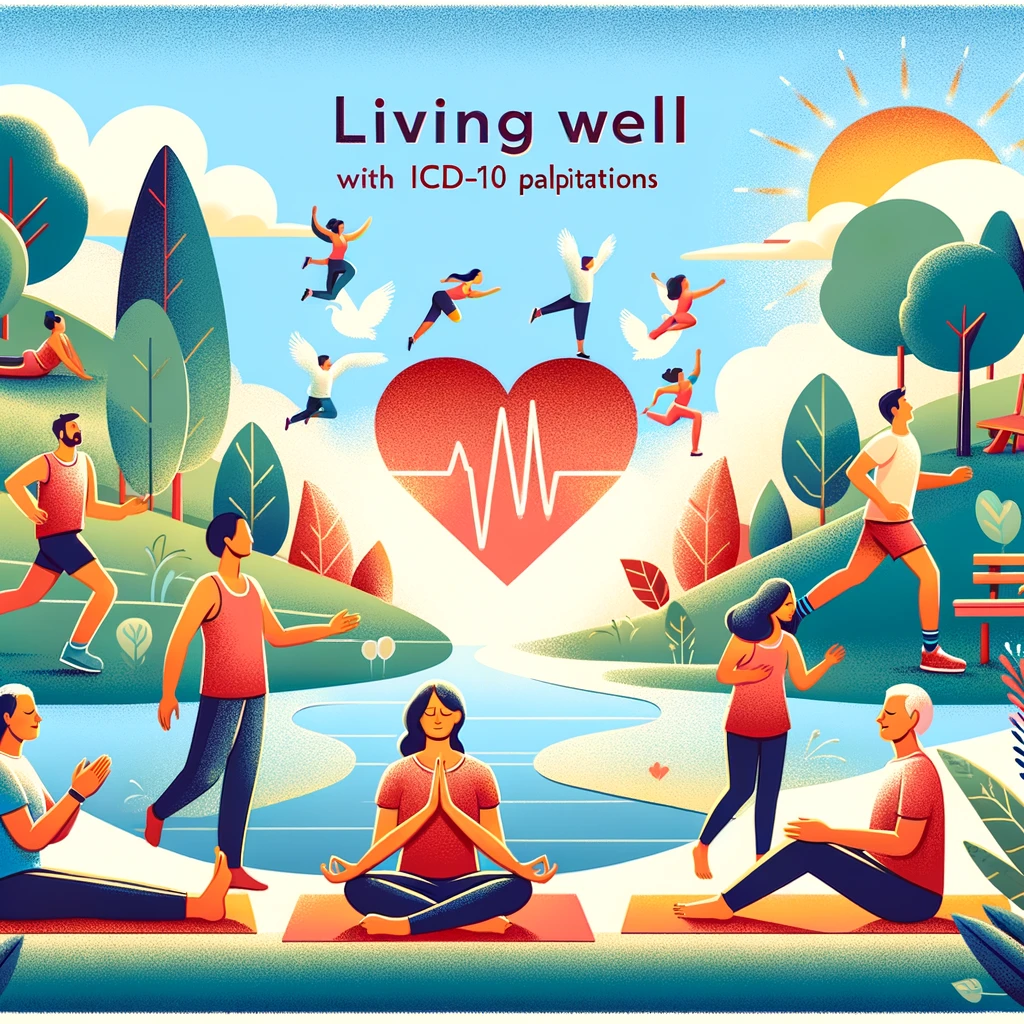Don’t Panic! That Fluttering Feeling Might Not Be a Heart Attack
Ever had that moment where your heart feels like it’s doing the Macarena in your chest? It can be a total shock, instantly sending your mind racing to the worst-case scenario: a heart attack. But take a deep breath and try to relax – in most cases, heart palpitations (also known as ICD 10 palpitations) are actually quite common and not a sign of immediate danger.
Here’s the truth: those skips, flops, or racing sensations you experience are essentially your heart’s way of having a mini rhythm party. Officially called palpitations, they can be caused by a variety of everyday factors, some more concerning than others. The good news is, with a little knowledge and maybe a visit to your doctor, you can understand these funky heartbeats and get back to feeling normal.
This blog will be your guide to understanding ICD 10 palpitations. We’ll break down what they are in simple terms, explore the different types (because yes, there’s more than one!), and even decipher that mysterious code, ICD 10 (don’t worry, it’s not as scary as it sounds!). So, grab a cup of tea, relax, and let’s unpack this whole “palpitation thing” together.

To minimize the chance, click on the link
Understanding Heart Palpitations: More Than Just a Skipped Beat
Imagine your heart as a steady metronome, keeping perfect time within your chest. Now imagine that metronome occasionally hitting a bum note – that’s kind of what a palpitation feels like. It’s a noticeable change in your heartbeat, often described as:
- Skipping a beat
- Feeling like your heart is flopping in your chest
- Racing faster than usual
- Pounding
These sensations can occur anywhere from a few seconds to several minutes and can be felt in your chest, throat, or even your neck. While it might feel alarming, it’s important to remember that occasional palpitations are usually harmless.
There are actually a few different types of heart palpitations, each with its own unique feeling:
- Extra beats: These feel like a sudden “flip-flop” in your chest, as if an extra beat snuck in there.
- Atrial fibrillation: This is a more irregular heartbeat that can feel like a fluttering sensation.
- Premature ventricular contractions (PVCs): These feel like a strong thump or thud in your chest.
Understanding the type of palpitation you’re experiencing can be helpful, but it’s not always necessary. The most important thing is to pay attention to how often they occur and if they’re accompanied by other symptoms.
Cracking the Code: Understanding ICD 10 Palpitations
Okay, so we’ve established that heart palpitations are those funky rhythm parties your heart throws sometimes. But what’s the deal with the whole “ICD 10” thing? Don’t worry, it’s not a secret code reserved for doctors. ICD-10 stands for International Classification of Diseases, 10th Revision. Basically, it’s a medical filing system that uses codes to categorize different health conditions.
Think of it like a giant library – ICD-10 is the filing system, and each code is like a Dewey Decimal number for a specific illness. So, when you have palpitations, your doctor might assign an ICD-10 code (like R00.2) to document it in your medical records.
Here’s the key: you don’t need a medical degree to understand your ICD-10 code for palpitations. It simply helps doctors track and diagnose your condition.
Daily Culprits: What Triggers Your Heart’s Mini Rhythm Party?
While a heart attack might be your first thought, most palpitations are triggered by everyday factors. Here are some of the usual suspects:
- Stress and Anxiety: Feeling overwhelmed? Your heart might react too. Stress hormones can mess with your heart’s rhythm, causing occasional skips or flutters.
- Dehydration: Dehydration means your body doesn’t have enough fluids to function properly. This can also affect your heart rate, leading to palpitations.
- Caffeine and Alcohol: Ever felt your heart race after a strong cup of coffee? Stimulants like caffeine and alcohol can temporarily increase your heart rate and trigger palpitations in some people.
- Lack of Sleep: When you’re sleep-deprived, your body goes into overdrive to compensate. This can manifest as heart palpitations, especially when you’re finally trying to drift off.
- Certain Medications: Some medications, like decongestants and asthma inhalers, can have heart palpitations as a side effect.
- Underlying Medical Conditions: In some cases, palpitations can be a symptom of an underlying medical condition, such as thyroid problems, anemia, or electrolyte imbalances.

This list is not exhaustive. If your palpitations are frequent, severe, or accompanied by other symptoms like chest pain, shortness of breath, or dizziness, it’s important to see your doctor to rule out any underlying issues.
When to See a Doctor: Don’t Ignore These Warning Signs
While occasional heart palpitations are usually nothing to worry about, there are times when it’s best to see your doctor. Here’s when you shouldn’t brush them off:
- Frequency and Intensity: If your palpitations are happening frequently (several times a day) or are very intense, lasting for several minutes, it’s a good idea to get checked out.
- Accompanying Symptoms: Pay attention to what else is happening when you experience palpitations. Warning signs include chest pain, shortness of breath, dizziness, lightheadedness, or fainting. These could indicate a more serious underlying condition.
- New or Different Feeling: If your palpitations feel different than usual – more intense, rapid, or accompanied by other sensations – it’s worth mentioning to your doctor.
- Pre-existing Conditions: If you have a pre-existing heart condition, any new or worsening palpitations should be checked by your doctor to ensure they’re not related.
Remember, there’s no shame in seeking medical advice. It’s always better to be safe than sorry, especially when it comes to your heart health.
Shedding Light: Diagnosing ICD 10 Palpitations
If your doctor suspects there might be more to your palpitations, they’ll likely recommend some tests to get a clearer picture. Here’s what you can expect:
- Physical Exam: Your doctor will listen to your heart and lungs, check your pulse, and ask you about your medical history and lifestyle habits.
- Electrocardiogram (ECG): This painless test records your heart’s electrical activity and can help identify rhythm problems.
- Holter Monitor: Sometimes, a 24-hour or 48-hour Holter monitor might be used. This portable device continuously tracks your heart rhythm throughout the day and night, giving your doctor a more complete picture of what’s happening.
- Other Tests: Depending on your situation, your doctor might recommend additional tests like an echocardiogram (ultrasound of the heart) or blood tests to rule out other causes.

By working together with your doctor, you can get to the root cause of your palpitations and find the best treatment plan to keep your heart healthy and your rhythm steady.
Calming the Rhythm: Treatment Options for ICD 10 Palpitations
Hearing the word “treatment” might make you think of medications and procedures, but the good news is, there are often natural ways to manage your palpitations and keep your heart happy.
The best approach depends on the underlying cause of your palpitations. If stress is the culprit, here are some tips to help you relax and find your inner zen:
- Stress Management Techniques: Practices like deep breathing, meditation, and yoga can be powerful tools for calming your mind and body, which can have a positive impact on your heart rhythm.
- Healthy Sleep Habits: Aim for 7-8 hours of quality sleep each night. When you’re well-rested, your body functions more efficiently, reducing stress and the likelihood of palpitations.
- Regular Exercise: Physical activity is a heart-healthy habit that can also help manage stress and improve your overall well-being. Just remember to check with your doctor before starting any new exercise program.
If lifestyle changes aren’t enough, your doctor might recommend medication to regulate your heart rhythm or address any underlying conditions.
Living Well with ICD 10 Palpitations: Taking Control of Your Heart Health
Even with a diagnosis of ICD 10 palpitations, you can still live a full and active life. Here are some tips for managing your heart health in the long term:
- Healthy Diet: Eating a balanced diet rich in fruits, vegetables, and whole grains can help keep your heart healthy and strong.
- Maintain a Healthy Weight: Excess weight can put additional strain on your heart. If you’re overweight or obese, talk to your doctor about healthy weight loss strategies.
- Limit Alcohol and Caffeine: While occasional indulgence might be okay, excessive alcohol and caffeine consumption can trigger palpitations in some people.
- Don’t Smoke: Smoking is a major risk factor for heart disease and can worsen palpitations. If you smoke, quitting is the single best thing you can do for your heart health.
- Regular Doctor Visits: Schedule regular checkups with your doctor to monitor your heart health and address any concerns you might have.

Remember, knowledge is power. By understanding your ICD 10 palpitations, working with your doctor, and adopting healthy lifestyle habits, you can take control of your heart health and keep your rhythm steady for years to come.
Keeping Your Heart in Rhythm: The Final Beat
Phew! We’ve covered a lot of ground when it comes to ICD 10 palpitations. Hopefully, you’re feeling empowered with knowledge and ready to navigate this little heart hiccup. But before we wrap things up, let’s revisit some key takeaways and answer the question: what can you do to keep your heart in a steady rhythm?
Understanding Your Palpitations:
Knowledge is the first step to managing any health concern. By understanding what palpitations are, the different types, and the possible triggers, you can become an active participant in your own well-being. This awareness empowers you to identify patterns and discuss any concerns with your doctor.
Pros of Understanding:
- Reduced anxiety: Knowing what’s causing those flutters can take away the fear of the unknown.
- Improved communication: Being able to clearly describe your symptoms to your doctor helps them diagnose and treat the issue more effectively.
- Proactive management: Once you understand your triggers, you can take steps to avoid them or manage them effectively.
Cons of Understanding:
- Information overload: There’s a lot of information out there, so it’s important to rely on reputable sources like your doctor and avoid getting overwhelmed.
- Self-diagnosis trap: While knowledge is powerful, it doesn’t replace professional medical advice. Don’t hesitate to seek help from your doctor if you have any concerns.
Final Verdict:
Understanding your ICD 10 palpitations is a powerful tool for managing your heart health. Don’t be afraid to ask questions, research from trusted sources, and work with your doctor to create a personalized plan.
Taking Charge of Your Heart Health:
Now that you have a better understanding of palpitations, it’s time to focus on the big picture: your overall heart health. Here’s where those healthy lifestyle habits come in. From stress-management techniques to a balanced diet and regular exercise, there are many ways to keep your heart happy and strong.
Pros of Healthy Habits:
- Reduced risk of heart disease: A healthy lifestyle is the cornerstone of heart health, preventing more serious issues down the road.
- Improved overall well-being: Healthy habits not only benefit your heart but also boost your energy levels, mood, and sleep quality.
- Empowers you: Taking control of your health choices gives you a sense of empowerment and puts you in the driver’s seat.
Cons of Healthy Habits:
- Requires effort: Making lifestyle changes takes commitment and effort, especially when faced with temptations or busy schedules.
- Results may vary: The impact of healthy habits can vary depending on individual factors. However, even small changes can make a big difference.
Final Verdict:
Investing in healthy habits is an investment in your long-term heart health and overall well-being. It might require some effort, but the rewards are worth it. Remember, small changes add up, so start where you can and celebrate your progress along the way.
Remember, you’re not alone! Palpitations are a common occurrence, and with the right information and approach, you can manage them effectively. Don’t hesitate to seek professional medical advice if your symptoms are frequent, severe, or accompanied by other concerning signs. By working together with your doctor and adopting healthy habits, you can keep your heart happy and your rhythm steady for a lifetime.
Frequently Asked Questions About ICD 10 Palpitations:
Q: Should I worry about heart palpitations?
A: Most occasional palpitations are harmless and don’t require any special treatment. However, if they’re frequent, severe, or accompanied by other symptoms like chest pain, shortness of breath, or dizziness, it’s best to see your doctor to rule out any underlying issues.
Q: What are some common triggers for palpitations?
A: Everyday culprits like stress, anxiety, dehydration, caffeine, lack of sleep, and certain medications can all trigger those funky heart rhythms.
Q: How can I tell if my palpitations are serious?
A: Here are some red flags to watch out for: frequent or intense palpitations, lasting for several minutes, accompanied by chest pain, shortness of breath, dizziness, lightheadedness, or fainting. If you experience any of these, consult your doctor.
Q: What tests do doctors use to diagnose palpitations?
A: A physical exam, electrocardiogram (ECG), and sometimes a Holter monitor (a portable device that tracks your heart rhythm for 24-48 hours) are common tools used by doctors to diagnose the cause of your palpitations.
Q: Is there any treatment for palpitations?
A: The good news is, there are often ways to manage your palpitations! For some, lifestyle changes like stress management techniques, healthy sleep habits, and regular exercise can make a big difference. If these aren’t enough, your doctor might recommend medication to regulate your heart rhythm or address any underlying conditions.
Q: I have a diagnosis of ICD 10 palpitations. Does that mean I can’t live a normal life?
A: Absolutely not! With a little knowledge and some healthy lifestyle habits, you can absolutely live a full and active life even with ICD 10 palpitations. The key is understanding your triggers, working with your doctor, and making choices that promote good heart health.
Q: Where can I find more information about heart health and palpitations?
A: Talk to your doctor! They’re the best resource for personalized advice. Additionally, reputable websites from organizations like the American Heart Association (https://www.heart.org/) or the National Heart, Lung, and Blood Institute (https://www.nhlbi.nih.gov/) offer a wealth of information.





